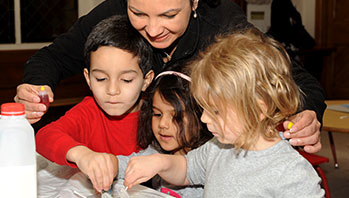- audio player
- materials to generate sounds
- recordings of various music
- rubber band guitars
- shakers
- toy instruments
- tubes
- music
- sound
MA Standards:
Speaking and Listening: SL.PK.MA.1 Participate in collaborative conversations with diverse partners during daily routines and play.
MA Draft STE Standards:
Physical Sciences/Energy PS4.A Investigate different sounds made by different objects and different materials and reason about what is making the sounds. [Cause and Effect]
Head Start Outcomes:
Approaches to Learning/Initiative and Curiosity Demonstrates flexibility, imagination, and inventiveness in approaching tasks and activities.
Approaches to Learning/Cooperation Joins in cooperative play with others and invites others to play.
PreK Learning Guidelines:
Science and Technology/Inquiry Skills 1 Ask and seek out answers to questions about objects and events with the assistance of interested adults.
Small Group: Making Music

© Commonwealth of Massachusetts, Department of Early Education and Care (Jennifer Waddell photographer). All rights reserved.
STEM Key Concepts: Different objects make different sounds; Sounds vary in three ways: by volume (loud or soft), pitch (high or low), and timbre (quality)
ELA Focus Skills: Creative Expression, Listening and Speaking
Continue sharing and exploring making music in small groups. Invite the groups to give a concert of the sounds they made. Have children work together to make music as a group. Say, Let’s make music. Use hand motions to start and end the concert. Say, What happens when we all play together? What does it sound like?
Social Emotional Tip: Encourage discussion and cooperation between children by asking them to congratulate each other for each other’s sounds.
